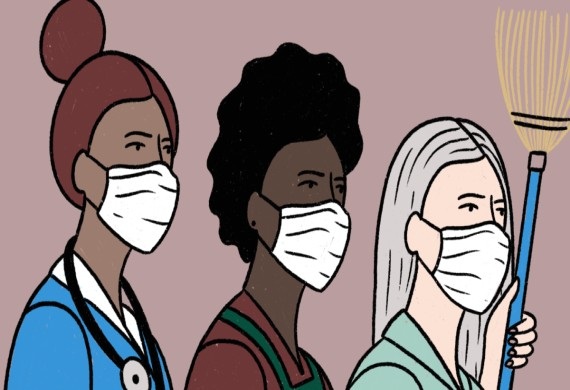
Effects of COVID-19 Pandemic on Women in Tech
By: WE Staff
A recent study has revealed the devastating effect of the COVID-19 pandemic on women in tech. The study, which was conducted by the San Francisco-based non-profit organisation, Girls in Tech, examined how the NGO's 40,000 members coped with the pandemic. The global study includes startling data showing that women who work for male bosses experience more burnout than women who work for female bosses.
According to Adriana Gascoigne, Founder & CEO of Girls in Tech, the research proves that women in tech are burnt out as a result of the pandemic.
Despite the fact that 93 percent of respondents said they were fortunate to have jobs, the study titled, The Tech Workplace for Women in the Pandemic, found that male managers are the leading cause of burnout for women in tech.
63 percent of respondents with male bosses said they were burnt out, as compared to 44 percent of those with female bosses. Employees at companies with a male executive reported burning out 85 percent of the time, compared to 15 percent of employees at companies with a female executive.
“Burnout is also connected to the closure of offices, schools, daycare, and pretty much everything else in society,” says Gascoigne.
Gascoigne further explained that while every household is different in the sharing of responsibilities, yet women spend more time than men on childcare, as a caregiver, and on housework. This equates to working a part-time job while already having a 40-hour workweek.
According to the survey, 86 percent of workers expect their employers to make changes to suit their needs, and 76 percent prefer working from home to working in an office. “Perhaps it’s fortunate that many women in the study don’t anticipate returning to the office in-person once pandemic restrictions are lifted,” commented Gascoigne.
According to the survey, 41 percent of respondents had experienced racial discrimination at work, and more than one in every four women had experienced sexual harassment. However, Gascoigne was hopeful that lessons will be learned. She stated that the study is proof that sitting idle won’t reverse the losses of working women over the last year.
Girls in Tech, her NGO, is attempting to change things with a new four-year initiative aimed at achieving gender diversity in tech boardrooms by 2025.
The report also brought to light the fact that COVID-19 pandemic has benefited and damaged women in positions of power. According to the report, pandemic results were "systematically and substantially improved in countries led by women," with many female leaders communicating better, locking down faster, and having fewer fatalities overall.
On the other hand, as a result of the pandemic, one in every four women is considering changing jobs or leaving the workforce. Facing an upward trend the previous year, female leadership growth plateaued last year, according to the survey.
As a result, while women in leadership positions showed stronger pandemic management, they were often forced to give up their careers and any hope of rising to the top.“The results from our study were abundantly clear,” Gascoigne said. “Organizations must realize this is at crisis level. We were particularly stunned to learn the impact a supervisor’s gender had on women’s burnout rate,” she added.
She also calls for organizations to acknowledge this evident disparity, dig deeper to better understand the issue, and take real, meaningful action toward positive change.
Founded in 2007, Girls in Tech is a non-profit organization dedicated to closing the massive gender gap that exists in the field of technology. The platform provides education and experiences to assist people in discovering and honing their special superpower. Its aim is to see every woman in tech embraced, optimistic, and respected for who she is. By delivering experiences and educational resources, the organization aims to close the gender gap in technology.
The global network of Girls in Tech has 60 chapters and more than 100,000 members in 37 countries. As a result, each chapter's activities and programming are tailored to meet the specific needs of each member.


.jpg)



